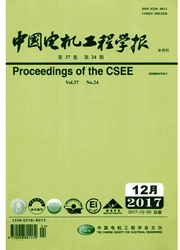

 中文摘要:
中文摘要:
针对三相并网逆变系统采用LCL滤波装置产生的控制及效率问题,该文通过对滤波器数学模型的推导、分析及转换,设计了一种在静止坐标系下受约束多目标优化的离散型电流模型预测控制器,使得对系统电流的跟踪效果及效率优化能在控制器中体现。然而对于受约束控制的优化问题,由于传统优化方法的复杂性和计算的庞大性,该文提出一种结合预测控制模型的修正分枝定界方法。该方法寻求三电平27个控制矢量中符合系统前后两拍输入矢量切换原则的控制序列,并综合考虑包含系统跟踪性、开关损耗及大电流条件切换损耗的预测性能指标值极小,达到系统最优控制。该策略解决了LCL滤波器易产生谐振的控制问题,保证系统的稳定性和跟踪性,降低系统损耗,并在一定程度上减少开关次数,相对其他受约束控制降低了处理器运算负担。仿真和实验结果很好的证明所提出的控制策略的正确性和有效性。
 英文摘要:
英文摘要:
In order to tackle with the grid-inverter system control and efficiency problems arising from using LCL filter device, based on derivation, analysis and transformation of its mathematical model, this paper designed a discrete current model predictive control(DCMPC) strategy with multi-objective constrained in the stationary coordinate system, which makes the trace ability of current and efficiency optimization can be embodied in the controller. While as for constrained optimization problems, due to the complexity and huge computation of traditional optimization methods, this paper proposed a modified branch and bound method which combined with predictive control model. The method sought the control vector sequence by complying with the switching principles of the two adjacent input vector among the 27 vectors, and considered that the comprehensive performance index value which contains the system trace ability, switching losses and large current conditions for switching losses is extremely small, so optimal control can be achieved. The method can solve the resonance problem of a LCL filter, guarantee the stability of the system and trace ability, reduce the system loss and the switching frequency at a certain extent. In addition, the CPU's computational burden can be reduced compared with other constrained controls. Simulation and experimental results are proved the correctness and effectiveness of the proposed control strategy.
 同期刊论文项目
同期刊论文项目
 同项目期刊论文
同项目期刊论文
 期刊信息
期刊信息
